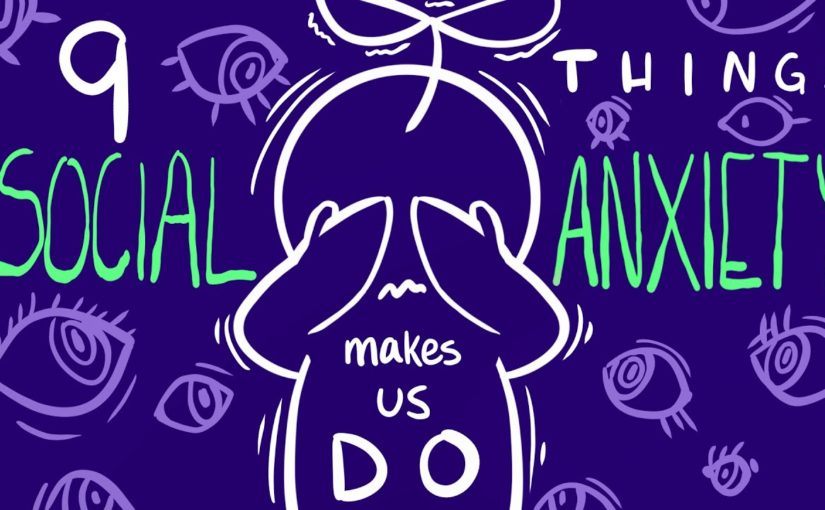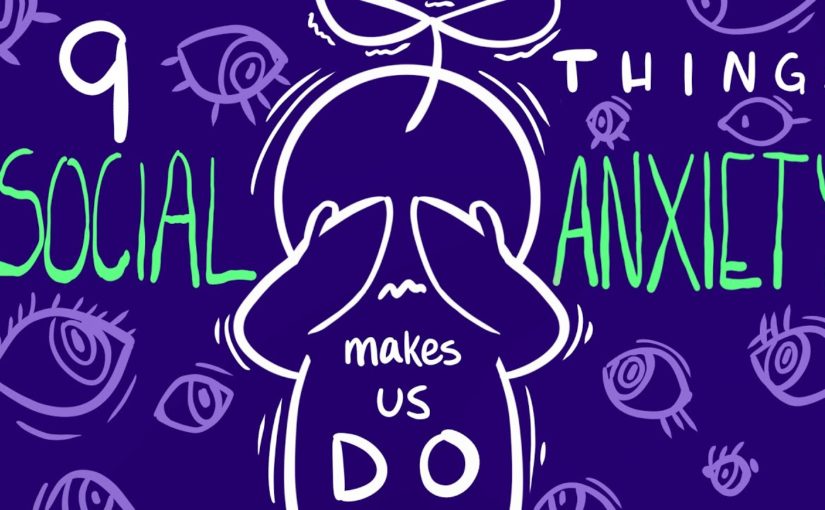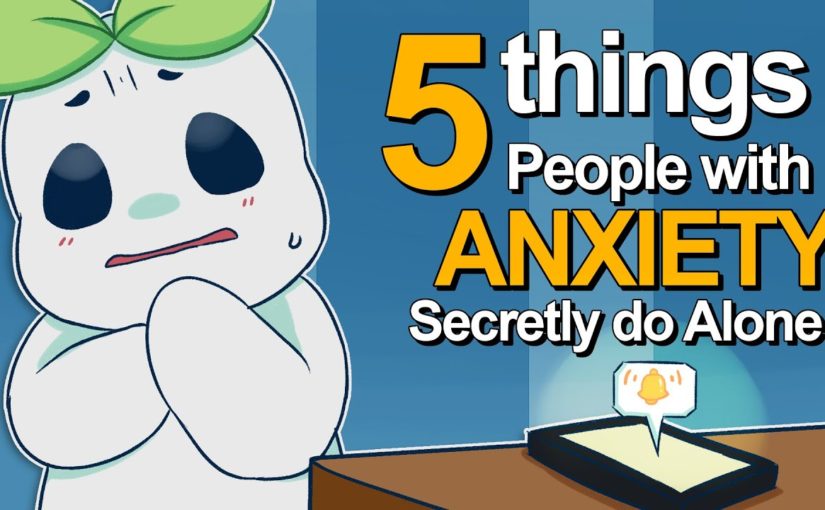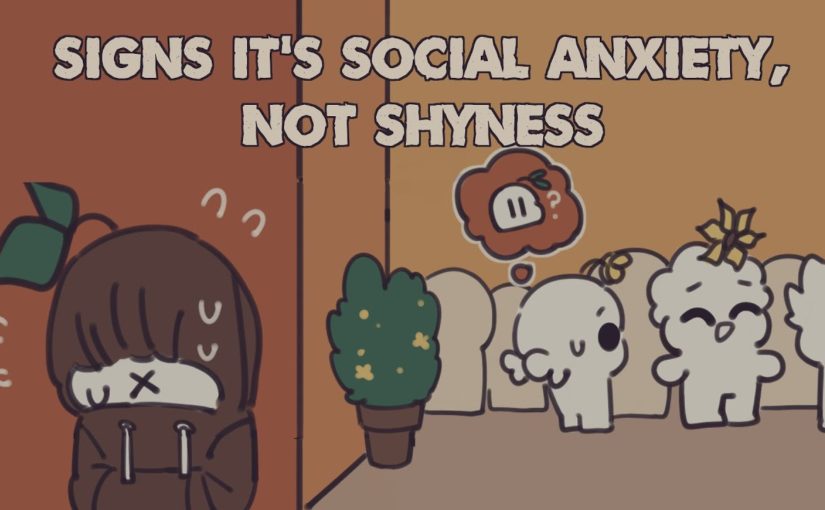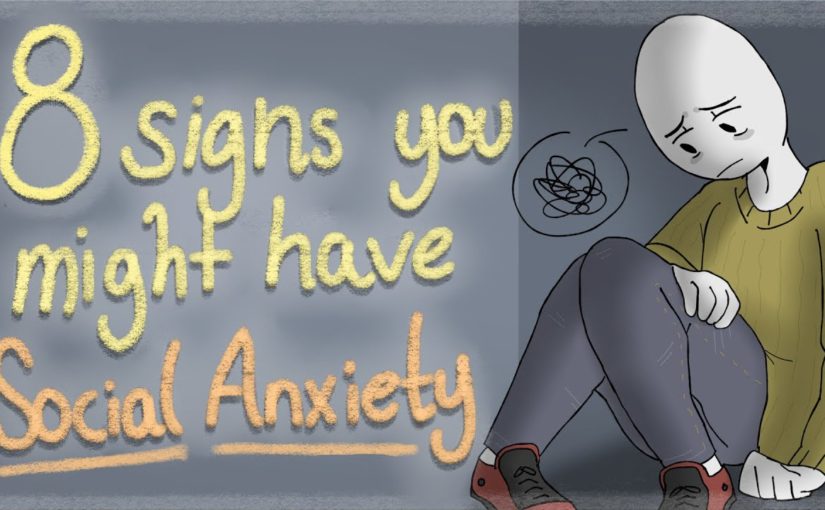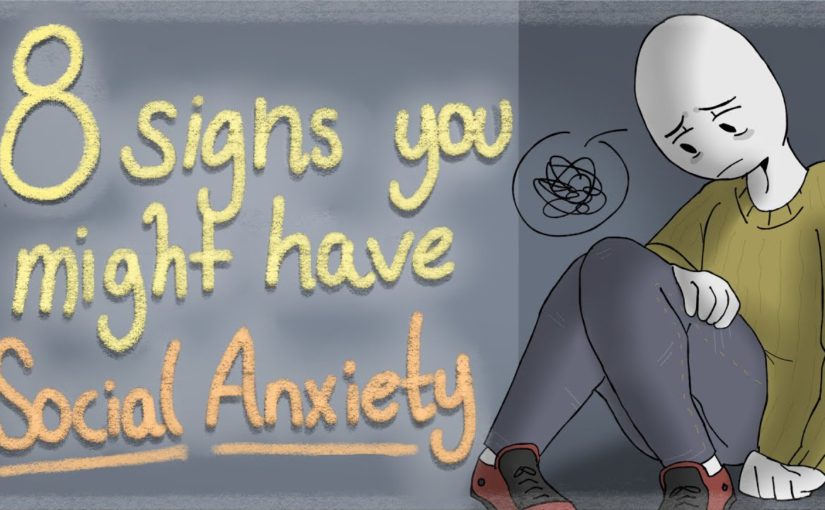Tag: social anxiety symptoms
9 Things Social Anxiety Makes Us Do
 It can be a lot easier to act busy rather than face the awkwardness of an unwanted conversation. So, this can become a habit of avoidance. If you have social anxiety, five constantly worrying about how everyone sees you. According to the Anxiety and Depression Association of America, those with a social anxiety disorder are increasingly concerned about how they are perceived by others. The last thing they want is to come off as awkward, fumbling, or boring. You’ve likely felt this way at some point throughout your life, whether it’s the desire to fit in with friends or make a good impression on a potential employer with social anxiety. However, this pressure to perform feels constantly heavy and can lead to full-blown panic attacks when in social or performance-based situations Number six is feeling lonely. Even when you’re surrounded by people, People with social anxiety can share this feeling with those who battle, depression and other mental illnesses as well. So, unfortunately, a lot of people can relate to this isolating feeling When social anxiety keeps you from being your true self. It can be difficult to feel included at all. It’s frustrating to be close to others, but not be able to connect with them in a comfortable way. If you’re struggling to effectively communicate and are extremely hesitant to even start a conversation that adds to your feelings of loneliness, even when you’re, surrounded by others, Number seven clenching your teeth and other physical discomforts, you feel shaky or lightheaded when faced with A social situation: Does your heart rate speed up or do your hands tremble? The stress that comes with social anxiety can manifest through physical symptoms. Many of the symptoms are signs of nervousness such as sweating, flushing, and feeling shaky According to Mayo Clinic. You might also be dealing with muscle tension, feeling that your mind has gone blank, or having trouble catching your breath. Number eight obsessing over how you look When you’re, constantly worried about how others perceive you. You’re likely to be concerned with how you look as well. You might have a distorted body image and think that you’re less physically attractive. Your thoughts can flit from your hair to your clothes or flaws in your skin. Thinking that it’s just all wrong In an attempt to feel comfortable in your own skin, you might spend an inappropriate amount of time and money on fixing your appearance, such as shopping for better clothes, getting high-end beauty products, or going on diets. If you think you’re overweight and number nine, you feel more like yourself around the people. You’re comfortable with Yourself, think you’re picky about who you spend time with, and triumph over shyness by conquering social anxiety disorder, Dr. Marie B. Stein and John R. Walker discusses behavior in children called selective mutism. This is when a child speaks and acts normally around select individuals but is completely silent around everyone else or when placed in certain situations. This is a more extreme example, but it shows how those with social anxiety are more likely to relax and open up around people. They already know and trust, do you or anyone you know resonate with any of these points mentioned in this video? If you’re concerned about social anxiety disorder, we encourage you to speak with a mental health professional. They can help you overcome any fears or debilitating problems you might have If you enjoyed watching this video, give us a thumbs up and share it with someone who might find it helpful as well. The studies and references used in this video are listed in the description below Don’t forget to hit the subscribe button for more Psych2go videos and as always thanks for watching and we’ll see you next time.As found on YouTubeNatural Synergy $47.⁰⁰ New Non-Invasive Alternative. To Electro-Acupuncture, Producing Astounding Results… Self-Application Is Easy, Rapid Response. You’re about to discover how both chronic and acute pain, skin conditions, migraines, and hundreds of ailments all stem from the same root cause ꆛ Yin Yang Ailments🗯 such as➯➱ ➫ ➪➬ Chronic pain⇝Low immunity⇝Chronic acid reflux⇝High blood pressure⇝Addictions⇝Fibromyalgia⇝Allergies⇝Osteoarthritis⇝Headaches⇝Low back⇝pain Asthma⇝Headaches⇝Depression and anxiety⇝Urinary problems… to name just a few…
It can be a lot easier to act busy rather than face the awkwardness of an unwanted conversation. So, this can become a habit of avoidance. If you have social anxiety, five constantly worrying about how everyone sees you. According to the Anxiety and Depression Association of America, those with a social anxiety disorder are increasingly concerned about how they are perceived by others. The last thing they want is to come off as awkward, fumbling, or boring. You’ve likely felt this way at some point throughout your life, whether it’s the desire to fit in with friends or make a good impression on a potential employer with social anxiety. However, this pressure to perform feels constantly heavy and can lead to full-blown panic attacks when in social or performance-based situations Number six is feeling lonely. Even when you’re surrounded by people, People with social anxiety can share this feeling with those who battle, depression and other mental illnesses as well. So, unfortunately, a lot of people can relate to this isolating feeling When social anxiety keeps you from being your true self. It can be difficult to feel included at all. It’s frustrating to be close to others, but not be able to connect with them in a comfortable way. If you’re struggling to effectively communicate and are extremely hesitant to even start a conversation that adds to your feelings of loneliness, even when you’re, surrounded by others, Number seven clenching your teeth and other physical discomforts, you feel shaky or lightheaded when faced with A social situation: Does your heart rate speed up or do your hands tremble? The stress that comes with social anxiety can manifest through physical symptoms. Many of the symptoms are signs of nervousness such as sweating, flushing, and feeling shaky According to Mayo Clinic. You might also be dealing with muscle tension, feeling that your mind has gone blank, or having trouble catching your breath. Number eight obsessing over how you look When you’re, constantly worried about how others perceive you. You’re likely to be concerned with how you look as well. You might have a distorted body image and think that you’re less physically attractive. Your thoughts can flit from your hair to your clothes or flaws in your skin. Thinking that it’s just all wrong In an attempt to feel comfortable in your own skin, you might spend an inappropriate amount of time and money on fixing your appearance, such as shopping for better clothes, getting high-end beauty products, or going on diets. If you think you’re overweight and number nine, you feel more like yourself around the people. You’re comfortable with Yourself, think you’re picky about who you spend time with, and triumph over shyness by conquering social anxiety disorder, Dr. Marie B. Stein and John R. Walker discusses behavior in children called selective mutism. This is when a child speaks and acts normally around select individuals but is completely silent around everyone else or when placed in certain situations. This is a more extreme example, but it shows how those with social anxiety are more likely to relax and open up around people. They already know and trust, do you or anyone you know resonate with any of these points mentioned in this video? If you’re concerned about social anxiety disorder, we encourage you to speak with a mental health professional. They can help you overcome any fears or debilitating problems you might have If you enjoyed watching this video, give us a thumbs up and share it with someone who might find it helpful as well. The studies and references used in this video are listed in the description below Don’t forget to hit the subscribe button for more Psych2go videos and as always thanks for watching and we’ll see you next time.As found on YouTubeNatural Synergy $47.⁰⁰ New Non-Invasive Alternative. To Electro-Acupuncture, Producing Astounding Results… Self-Application Is Easy, Rapid Response. You’re about to discover how both chronic and acute pain, skin conditions, migraines, and hundreds of ailments all stem from the same root cause ꆛ Yin Yang Ailments🗯 such as➯➱ ➫ ➪➬ Chronic pain⇝Low immunity⇝Chronic acid reflux⇝High blood pressure⇝Addictions⇝Fibromyalgia⇝Allergies⇝Osteoarthritis⇝Headaches⇝Low back⇝pain Asthma⇝Headaches⇝Depression and anxiety⇝Urinary problems… to name just a few…
9 Things Social Anxiety Makes Us Do
 The last thing they want
is to come off as awkward, fumbling, or boring. You’ve likely felt this way at some point throughout your life, whether it’s the desire
to fit in with friends or make a good impression
on a potential employer, with social anxiety however, this pressure to perform
feels constantly heavy and can lead to full-blown panic attacks when in social or
performance-based situations. Number six is feeling lonely, even when you’re surrounded by people. People with social anxiety
can share this feeling with those who battle depression and other mental illnesses as well. So, unfortunately, a lot
of people can relate to this isolating feeling. When social anxiety keeps you
from being your true self, it can be difficult to
feel included at all. It’s frustrating to be close to others, but not be able to connect
with them comfortably. If you’re struggling
to properly communicate and are extremely hesitant
to even start a conversation, that adds to your feelings of loneliness, even when you’re surrounded by others. Number seven, clenching your teeth and other physical discomforts. You feel shaky or lightheaded when faced with a social situation. Does your heart rate speed
up, or do your hands tremble? The stress that comes with social anxiety can manifest through physical symptoms. Many of the symptoms are
signs of nervousness, such as sweating, flushing,
and feeling shaky. According to the Mayo Clinic, you might also be dealing
with muscle tension, feeling that your mind has gone blank, or having trouble catching your breath. Number eight, obsessing over how you look. When you’re constantly worried about how others perceive you, you’re likely to be concerned
with how you look as well. You might have a distorted body image and think that you’re less
physically attractive. Your thoughts can flit from
your hair to your clothes or flaws in your skin, thinking
that it’s just all wrong. In an attempt to feel
comfortable in your skin, you might spend an inappropriate
amount of time and money on fixing your appearance, such as shopping for better clothes, getting high-end beauty
products, or going on diets if you think you’re overweight. And number nine, you
feel more like yourself around the people you’re comfortable with. You think you’re picky about
who you spend time with and triumph over shyness, conquering social anxiety disorder, Dr. Marie B. Stein and John R. Walker discuss behavior in children
called selective mutism. This is when a child
speaks and acts normally around select individuals,
but is completely silent around everyone else, or when
placed in certain situations, this is a more extreme example, but it shows how those with social anxiety are more likely to relax and open up around people they already know and trust. Do you or anyone you know resonate with any of these points
mentioned in this video? If you’re concerned about
social anxiety disorder, we encourage you to speak with
a mental health professional, they can help you overcome any fears or debilitating problems you might have. If you enjoyed watching this
video, give us a thumbs up and share it with someone who
might find it helpful as well. The studies and references
used in this video are listed in the description below. Don’t forget to hit the subscribe button for more Psych2go videos and as always, thanks for watching, and we’ll see you next time.As found on YouTubeAFFILIATE MASTERY BONUS: 6-Week LIVE Series Has Begun! FunnelMates $46.⁹⁵ Replays are Instantly Available. Want A Profitable Mailing List But Not Sure Where To Begin? We’ll Guide You, Equip You, and even PAY You Cash To Do It!
The last thing they want
is to come off as awkward, fumbling, or boring. You’ve likely felt this way at some point throughout your life, whether it’s the desire
to fit in with friends or make a good impression
on a potential employer, with social anxiety however, this pressure to perform
feels constantly heavy and can lead to full-blown panic attacks when in social or
performance-based situations. Number six is feeling lonely, even when you’re surrounded by people. People with social anxiety
can share this feeling with those who battle depression and other mental illnesses as well. So, unfortunately, a lot
of people can relate to this isolating feeling. When social anxiety keeps you
from being your true self, it can be difficult to
feel included at all. It’s frustrating to be close to others, but not be able to connect
with them comfortably. If you’re struggling
to properly communicate and are extremely hesitant
to even start a conversation, that adds to your feelings of loneliness, even when you’re surrounded by others. Number seven, clenching your teeth and other physical discomforts. You feel shaky or lightheaded when faced with a social situation. Does your heart rate speed
up, or do your hands tremble? The stress that comes with social anxiety can manifest through physical symptoms. Many of the symptoms are
signs of nervousness, such as sweating, flushing,
and feeling shaky. According to the Mayo Clinic, you might also be dealing
with muscle tension, feeling that your mind has gone blank, or having trouble catching your breath. Number eight, obsessing over how you look. When you’re constantly worried about how others perceive you, you’re likely to be concerned
with how you look as well. You might have a distorted body image and think that you’re less
physically attractive. Your thoughts can flit from
your hair to your clothes or flaws in your skin, thinking
that it’s just all wrong. In an attempt to feel
comfortable in your skin, you might spend an inappropriate
amount of time and money on fixing your appearance, such as shopping for better clothes, getting high-end beauty
products, or going on diets if you think you’re overweight. And number nine, you
feel more like yourself around the people you’re comfortable with. You think you’re picky about
who you spend time with and triumph over shyness, conquering social anxiety disorder, Dr. Marie B. Stein and John R. Walker discuss behavior in children
called selective mutism. This is when a child
speaks and acts normally around select individuals,
but is completely silent around everyone else, or when
placed in certain situations, this is a more extreme example, but it shows how those with social anxiety are more likely to relax and open up around people they already know and trust. Do you or anyone you know resonate with any of these points
mentioned in this video? If you’re concerned about
social anxiety disorder, we encourage you to speak with
a mental health professional, they can help you overcome any fears or debilitating problems you might have. If you enjoyed watching this
video, give us a thumbs up and share it with someone who
might find it helpful as well. The studies and references
used in this video are listed in the description below. Don’t forget to hit the subscribe button for more Psych2go videos and as always, thanks for watching, and we’ll see you next time.As found on YouTubeAFFILIATE MASTERY BONUS: 6-Week LIVE Series Has Begun! FunnelMates $46.⁹⁵ Replays are Instantly Available. Want A Profitable Mailing List But Not Sure Where To Begin? We’ll Guide You, Equip You, and even PAY You Cash To Do It!  ☃in 5-10 Minutes A Day Using Automation Software and our Time-Tested Strategy See How Your New Site Can Be Live In Just 27 Seconds From Now!
☃in 5-10 Minutes A Day Using Automation Software and our Time-Tested Strategy See How Your New Site Can Be Live In Just 27 Seconds From Now!5 Things People With Anxiety Secretly Do Alone
– Hey Psych2Goers, welcome back. Think you've never experienced anxiety before? Well, you might not have realized it because people experience anxiety in different ways. Your idea of anxiety might not align with how you experience it. And you may not notice anxiety in someone who grapples with it privately. So, it's important to remember to always be kind because you can never know what others are struggling with when they're alone. If you're dealing with anxiety, know that you're not alone in facing these challenges. Anxiety is a normal part of life.
It alerts us to dangers and helps us prepare for a wide variety of situations. But according to the Diagnostic and Statistical Manual of Mental Disorders, DSM, anxiety becomes a disorder when it starts to impact daily functioning and different aspects of life. With that said, here are five things people with anxiety secretly do alone. Number one, overthink, overthink, and overthink. Anxiety disorders are characterized by excessive or disproportionate worry and fear that gets in the way of daily activities. It may not be as obvious to other people, but those who struggle with anxiety tend to overthink while in the presence of others and when alone. Many people who struggle with anxiety tend to dwell on negative thoughts about themselves and their past. They may replay these past events in their head over and over, trying to think of what they could have done differently.
And may also imagine possible future events to try and anticipate things that might go wrong. Two, confine themselves to their comfort zone. Everyone feels anxious now and then, but those struggling with an anxiety disorder constantly adjust their lives to cater to it. They may stick to activities that calm their racing thoughts, or engage in pursuits that allow them to avoid the things that make them feel anxious instead of choosing activities purely for fun or interest. Like re-watching the same shows over and over because they don't have to feel anxious anticipating what might happen next. Some people may not even be able to leave the house out of fear of being in places and situations where escape may be difficult.

Or they may struggle to leave the house without a certain person they're scared to lose. Three, withdraw from social interaction. Some people with anxiety may have a limited social life and turn down invites, not out of a lack of interest, but to stay home to calm certain worries and fears. In some cases, the person may seem uninterested in spending time with others due to a crippling fear of feeling humiliated, rejected, or looked down on in social interactions. People with anxiety may withdraw socially to cope with their fears and might avoid their phones or ignore or turn off their notifications to manage their feelings of anxiety, and then feel overwhelmed and anxious later when they see the backlog of messages. Number four, procrastinate or struggle to finish tasks. People with anxiety, especially high functioning anxiety, may seem like completely put together achievers, but they may also grapple with getting their work done when they're alone, because anxious thoughts may force them to procrastinate.
Anxiety also affects working memory, which makes it difficult to focus long enough to complete tasks. And so, they may then have to rush to get things done on time, adding extra stress. Then number five, tossing and turning in bed. Having anxiety doesn't immediately translate to nervous, jittery energy that others can easily detect. Someone with anxiety can seem calm and rested, when in reality, they might be tossing and turning at night, unable to fall asleep because of their anxious thoughts. If they do manage to get some sleep, they might be restless or riddled with nightmares about their anxieties. For example, those with separation anxiety disorder may have nightmares about being separated from their loved ones. Anxiety disorders are complex and varied, but remember that a certain level of anxiety is normal and anxiety disorders are those that cause significant distress or impairment in different areas of life.
If you or anyone you know, are struggling with an anxiety disorder, please don't hesitate to reach out to a qualified mental health care provider. Can you relate to any of these signs? Share with us in the comments and remember to like and share this video with someone who might benefit too. As always the references and studies used are listed in the description below. Until next time, take care friends..
As found on YouTube
7 Things Only People With Social Anxiety Will Understand
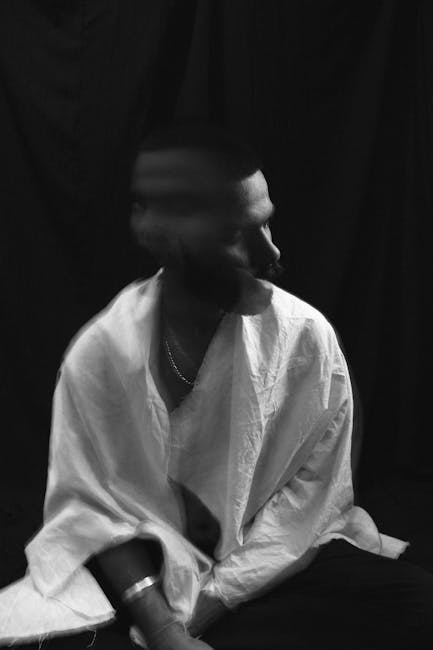 When it comes to friends, quality is greater than quantity, Not everyone.’s idea of fun includes hanging out with a huge group of people or going to a party.It can be intimidating to be around a lot of people.You don’t know, And you’d – much rather prefer to spend time with a few close friends.The beauty of life is that no two experiences are the same, So there’s a friend out there for everyone, Even if you may be socially anxious.Five, it’s, not all in your head. Social anxiety can manifest as physical sensations for a lot of people.These symptoms are similar to feeling embarrassed, sweaty, hands, blushing hyperventilating, but can feel more intense and last longer.Facing social situations can potentially lead to panic attacks for some people, while others feel physically ill or faint.These physical symptoms may be scary, but they rarely are threatening to one’s immediate health Number.Six, you feel, like everyone is judging you When you’re socially anxious it can feel like you’re under a magnifying glass all the time.You feel overly conscious about yourself and project those worries onto other people about their perceptions of you, but just because you’re monitoring every detail about yourself, doesn’t mean everyone else is too In reality.People aren’t as focused on you, as you think, and they likely have their worries too And number seven.You are your harshest judge.When you’re socially anxious, you might find yourself comparing how you think act, or look to others.This self-criticism can seriously hurt your mental and emotional health and it’s important to treat yourself more kindly While it might feel like others, make connections more easily or have it so. Well, it’s important to remember that everyone is going through their things and they have worries and concerns.Just like you do.When it comes to social anxiety, it can be hard to interact with people or make friends when you’re overly worried.The truth is, though, there is no normal when it comes to being social.Everyone has their way of socializing with others, And you’ll find someone who you connect with on the same level.There’s nothing wrong with leaving early or spending another night at home with your dog.We hope you enjoyed this and found some comfort.What have your experiences been with social anxiety? Leave a comment down below to share your thoughts.If you enjoyed our video, please give it a like and subscribe to our channel for more content like this.Thanks for watching – and we’ll see you at the next one.As found on YouTubeAnimated Video Maker – Create Amazing Explainer Videos | VidToon™ #1 Top Video Animation Software To Make Explainer, Marketing, Animated Videos Online It’s EASIER, PRODUCTIVE, FASTER Get Commercial Rights INCLUDED when you act NOW Get Vidtoon™
When it comes to friends, quality is greater than quantity, Not everyone.’s idea of fun includes hanging out with a huge group of people or going to a party.It can be intimidating to be around a lot of people.You don’t know, And you’d – much rather prefer to spend time with a few close friends.The beauty of life is that no two experiences are the same, So there’s a friend out there for everyone, Even if you may be socially anxious.Five, it’s, not all in your head. Social anxiety can manifest as physical sensations for a lot of people.These symptoms are similar to feeling embarrassed, sweaty, hands, blushing hyperventilating, but can feel more intense and last longer.Facing social situations can potentially lead to panic attacks for some people, while others feel physically ill or faint.These physical symptoms may be scary, but they rarely are threatening to one’s immediate health Number.Six, you feel, like everyone is judging you When you’re socially anxious it can feel like you’re under a magnifying glass all the time.You feel overly conscious about yourself and project those worries onto other people about their perceptions of you, but just because you’re monitoring every detail about yourself, doesn’t mean everyone else is too In reality.People aren’t as focused on you, as you think, and they likely have their worries too And number seven.You are your harshest judge.When you’re socially anxious, you might find yourself comparing how you think act, or look to others.This self-criticism can seriously hurt your mental and emotional health and it’s important to treat yourself more kindly While it might feel like others, make connections more easily or have it so. Well, it’s important to remember that everyone is going through their things and they have worries and concerns.Just like you do.When it comes to social anxiety, it can be hard to interact with people or make friends when you’re overly worried.The truth is, though, there is no normal when it comes to being social.Everyone has their way of socializing with others, And you’ll find someone who you connect with on the same level.There’s nothing wrong with leaving early or spending another night at home with your dog.We hope you enjoyed this and found some comfort.What have your experiences been with social anxiety? Leave a comment down below to share your thoughts.If you enjoyed our video, please give it a like and subscribe to our channel for more content like this.Thanks for watching – and we’ll see you at the next one.As found on YouTubeAnimated Video Maker – Create Amazing Explainer Videos | VidToon™ #1 Top Video Animation Software To Make Explainer, Marketing, Animated Videos Online It’s EASIER, PRODUCTIVE, FASTER Get Commercial Rights INCLUDED when you act NOW Get Vidtoon™7 Signs It’s Social Anxiety, Not Shyness
 Is the mirror your trustee audience months before a public event? Before a big event, like a presentation, it’s normal to feel a bit anxious. If it’s shyness holding you back, it can diminish over a while. However, if you
experienced social anxiety, you might think for months about all the things that could go wrong. In some cases, these thoughts can accumulate in your mind and lead you to avoid
the event or situation. This behavior can be particularly damaging if it’s school or work-related. Having an honest support system can help alleviate the
worst of the jitters. Number six, a past
negative social experience. Is there a rigid memory of things going awry in a social setting? When you first experience a setback at a social event, it tends to take root in you in the form of dread. However, if it was just shyness, the next time you encounter such a setting and come out unscathed, some of that dread chips away. But when you’re socially anxious, no amount of chipping away is sufficient. You are always expecting the worst possible consequences. You lose interest in even working on basic social skills. Although the definitive cause for social anxiety is unknown, researchers believe that
underdeveloped social skills can lead to social anxiety. Being teased or bullied for being socially awkward can lead you to fear
further social interactions and exacerbate social anxiety. And number seven, spending time after a social situation analyzing your performance and identifying flaws
in your interactions. Do you mull over conversations
way into the night? Are you constantly thinking up how you should have responded long after the topic is over? Sometimes we revisit past moments to learn from them and become better. But obsessing over a past detail usually ends with insecurities creeping out from the corners of your mind to make you feel inferior. However, for someone with social anxiety, obsessing over a small detail does not feel like a choice. Social anxiety is about seeing yourself through the lens of someone else. Hence, you might be prone to dwelling on and analyzing past interactions, especially conversations. The trigger is in the part of the conversation that you keep replaying. Only when you figure out a better response can you let it go. Letting go is a difficult step and it might take some time to learn. Everyone experiences
anxiety to varying degrees. Hence, professional advice tailored to meet individual needs is essential to ensure positive results. Your apprehensions are by no means a reason for you to
swear off from society. By seeking appropriate support and help, you can soon view the outside world as your conquered battlefield. Have you ever had the two mixed? What has helped you cope
with social anxiety? Feel free to leave a comment down below with your thoughts,
experiences, or suggestions. If you found this video helpful, be sure to hit the like button and share it with those out there, pondering the two. Don’t forget to subscribe to Psych2Go and hit the notification
bell for more new videos. Thanks for watching.As found on YouTubeShow me the simple steps to overcome shyness & cure social anxiety ➫ The Shyness and Social Anxiety System was created by Sean Cooper, a former social anxiety sufferer. Learn how to overcome your quietness, erase your insecurities and be confident around people using proven psychology.
Is the mirror your trustee audience months before a public event? Before a big event, like a presentation, it’s normal to feel a bit anxious. If it’s shyness holding you back, it can diminish over a while. However, if you
experienced social anxiety, you might think for months about all the things that could go wrong. In some cases, these thoughts can accumulate in your mind and lead you to avoid
the event or situation. This behavior can be particularly damaging if it’s school or work-related. Having an honest support system can help alleviate the
worst of the jitters. Number six, a past
negative social experience. Is there a rigid memory of things going awry in a social setting? When you first experience a setback at a social event, it tends to take root in you in the form of dread. However, if it was just shyness, the next time you encounter such a setting and come out unscathed, some of that dread chips away. But when you’re socially anxious, no amount of chipping away is sufficient. You are always expecting the worst possible consequences. You lose interest in even working on basic social skills. Although the definitive cause for social anxiety is unknown, researchers believe that
underdeveloped social skills can lead to social anxiety. Being teased or bullied for being socially awkward can lead you to fear
further social interactions and exacerbate social anxiety. And number seven, spending time after a social situation analyzing your performance and identifying flaws
in your interactions. Do you mull over conversations
way into the night? Are you constantly thinking up how you should have responded long after the topic is over? Sometimes we revisit past moments to learn from them and become better. But obsessing over a past detail usually ends with insecurities creeping out from the corners of your mind to make you feel inferior. However, for someone with social anxiety, obsessing over a small detail does not feel like a choice. Social anxiety is about seeing yourself through the lens of someone else. Hence, you might be prone to dwelling on and analyzing past interactions, especially conversations. The trigger is in the part of the conversation that you keep replaying. Only when you figure out a better response can you let it go. Letting go is a difficult step and it might take some time to learn. Everyone experiences
anxiety to varying degrees. Hence, professional advice tailored to meet individual needs is essential to ensure positive results. Your apprehensions are by no means a reason for you to
swear off from society. By seeking appropriate support and help, you can soon view the outside world as your conquered battlefield. Have you ever had the two mixed? What has helped you cope
with social anxiety? Feel free to leave a comment down below with your thoughts,
experiences, or suggestions. If you found this video helpful, be sure to hit the like button and share it with those out there, pondering the two. Don’t forget to subscribe to Psych2Go and hit the notification
bell for more new videos. Thanks for watching.As found on YouTubeShow me the simple steps to overcome shyness & cure social anxiety ➫ The Shyness and Social Anxiety System was created by Sean Cooper, a former social anxiety sufferer. Learn how to overcome your quietness, erase your insecurities and be confident around people using proven psychology.8 Signs You Might Have Social Anxiety
 ..no matter how close you are or how long you’ve known them. #5 It doesn’t go away with familiarity. It’s normal to feel shy at the beginning of a new relationship. But as you get to know each other the tension will start to subside. This isn’t the case if you have social anxiety. Instead, you always experience fear distress, and embarrassment whenever you’re around other people. Doesn’t matter if it’s your parent’s siblings or best friend.. ..you always feel uneasy and stressed unless you’re alone. #6 You overanalyze everything. Have you ever said things to yourself like; “I took too long to reply and now she doesn’t like me ..” or “He didn’t say hello this morning because he’s upset with me ..” Social anxiety can make you obsess over your social interactions. You may spend a lot of time and energy.. ..analyzing other people’s facial expressions.. ..body language and tone of voice.. ..to see if they mean what they’re saying or not. #7 You avoid social situations. Are you often absent or very late to social gatherings? It’s a serious matter if your social anxiety leads you to avoid social situations altogether. You decline invitations, refuse to speak in front of people, ..and would rather sit in the corner.. ..to avoid being noticed and mingle with anyone else. It doesn’t matter if it’s a normal day at work or school.. ..your birthday party, or even your wedding day. And #8 You have physical symptoms. Do you feel nausea? dizziness or chest palpitations when you’re in social situations? Just like most anxiety disorders.. ..social anxiety is often accompanied by physical symptoms. Some common ones are sweaty palms, shortness of breath.. lightheadedness, and trembling. While these are also the same signs of someone having a panic attack. You’ll be able to tell the difference if you only show these symptoms.. ..when anticipating or being out in a social setting. Do you relate to any of these symptoms above? Let us know in the comments below. If you do, you’re not alone…nor are you bad for feeling this way. The references and studies used in this video are added in the description below. If you find this video helpful, be sure to like, subscribe…and share this video with those who might benefit from it as well! Thanks for watching and we’ll see you in the next video!As found on YouTubeShow me the simple steps to overcome shyness & cure social anxiety ➫ The Shyness and Social Anxiety System was created by Sean Cooper, a former social anxiety sufferer. Learn how to overcome your quietness, erase your insecurities and be confident around people using proven psychology.
..no matter how close you are or how long you’ve known them. #5 It doesn’t go away with familiarity. It’s normal to feel shy at the beginning of a new relationship. But as you get to know each other the tension will start to subside. This isn’t the case if you have social anxiety. Instead, you always experience fear distress, and embarrassment whenever you’re around other people. Doesn’t matter if it’s your parent’s siblings or best friend.. ..you always feel uneasy and stressed unless you’re alone. #6 You overanalyze everything. Have you ever said things to yourself like; “I took too long to reply and now she doesn’t like me ..” or “He didn’t say hello this morning because he’s upset with me ..” Social anxiety can make you obsess over your social interactions. You may spend a lot of time and energy.. ..analyzing other people’s facial expressions.. ..body language and tone of voice.. ..to see if they mean what they’re saying or not. #7 You avoid social situations. Are you often absent or very late to social gatherings? It’s a serious matter if your social anxiety leads you to avoid social situations altogether. You decline invitations, refuse to speak in front of people, ..and would rather sit in the corner.. ..to avoid being noticed and mingle with anyone else. It doesn’t matter if it’s a normal day at work or school.. ..your birthday party, or even your wedding day. And #8 You have physical symptoms. Do you feel nausea? dizziness or chest palpitations when you’re in social situations? Just like most anxiety disorders.. ..social anxiety is often accompanied by physical symptoms. Some common ones are sweaty palms, shortness of breath.. lightheadedness, and trembling. While these are also the same signs of someone having a panic attack. You’ll be able to tell the difference if you only show these symptoms.. ..when anticipating or being out in a social setting. Do you relate to any of these symptoms above? Let us know in the comments below. If you do, you’re not alone…nor are you bad for feeling this way. The references and studies used in this video are added in the description below. If you find this video helpful, be sure to like, subscribe…and share this video with those who might benefit from it as well! Thanks for watching and we’ll see you in the next video!As found on YouTubeShow me the simple steps to overcome shyness & cure social anxiety ➫ The Shyness and Social Anxiety System was created by Sean Cooper, a former social anxiety sufferer. Learn how to overcome your quietness, erase your insecurities and be confident around people using proven psychology.8 Signs You Might Have Social Anxiety
 5. It doesn’t go away with familiarity. It’s normal to feel shy at the beginning of a new relationship, But, as you get to know each other, the tension will start to subside This isn’t the case. If you have social anxiety Instead, you always experience fear, distress, and embarrassment. Whenever you’re around other people, Doesn’t matter, if it’s your parents, siblings, or best friend, you always feel uneasy and stressed unless you’re alone, 6, You overanalyze everything. Have you ever said things to yourself like I took too long to reply and now she doesn’t like me, or He didn’t, say hello this morning, because he’s upset with me? Social anxiety can make you obsess over your social interactions. You may spend a lot of time and energy analyzing other people,’s, facial expressions, body, language, and tone of voice to see if they mean what they’re saying or not. 7. You avoid social situations. Are you often absent or very late to social gatherings? It’s a serious matter if your social anxiety leads you to avoid social situations altogether, You decline, invitations refuse to speak in front of people, and would rather sit in the corner to avoid being noticed and mingle with anyone else. It doesn’t matter if it’s a normal day at work or school, your birthday party, or even your wedding day And 8. You have physical symptoms. Do you feel nausea, dizziness, or chest palpitations when you’re in social situations, Just like most anxiety disorders, social anxiety is often accompanied by physical symptoms. Some common ones are sweaty palms shortness of breath, lightheadedness, and trembling. While these are also the same signs of someone having a panic attack, You’ll be able to tell the difference if you only show these symptoms when anticipating or being out in a social setting, Do you relate to any of these symptoms? Above, Let us know in the comments below, If you do, you, ‘re, definitely not alone. Nor are you bad for feeling this way, The references and studies used in this video are added in the description below. If you find this video helpful be sure to like subscribe and share this video with those who might benefit from it as well, Thanks for watching and we’ll see you in the next video Continue reading 8 Signs You Might Have Social Anxiety
5. It doesn’t go away with familiarity. It’s normal to feel shy at the beginning of a new relationship, But, as you get to know each other, the tension will start to subside This isn’t the case. If you have social anxiety Instead, you always experience fear, distress, and embarrassment. Whenever you’re around other people, Doesn’t matter, if it’s your parents, siblings, or best friend, you always feel uneasy and stressed unless you’re alone, 6, You overanalyze everything. Have you ever said things to yourself like I took too long to reply and now she doesn’t like me, or He didn’t, say hello this morning, because he’s upset with me? Social anxiety can make you obsess over your social interactions. You may spend a lot of time and energy analyzing other people,’s, facial expressions, body, language, and tone of voice to see if they mean what they’re saying or not. 7. You avoid social situations. Are you often absent or very late to social gatherings? It’s a serious matter if your social anxiety leads you to avoid social situations altogether, You decline, invitations refuse to speak in front of people, and would rather sit in the corner to avoid being noticed and mingle with anyone else. It doesn’t matter if it’s a normal day at work or school, your birthday party, or even your wedding day And 8. You have physical symptoms. Do you feel nausea, dizziness, or chest palpitations when you’re in social situations, Just like most anxiety disorders, social anxiety is often accompanied by physical symptoms. Some common ones are sweaty palms shortness of breath, lightheadedness, and trembling. While these are also the same signs of someone having a panic attack, You’ll be able to tell the difference if you only show these symptoms when anticipating or being out in a social setting, Do you relate to any of these symptoms? Above, Let us know in the comments below, If you do, you, ‘re, definitely not alone. Nor are you bad for feeling this way, The references and studies used in this video are added in the description below. If you find this video helpful be sure to like subscribe and share this video with those who might benefit from it as well, Thanks for watching and we’ll see you in the next video Continue reading 8 Signs You Might Have Social Anxiety
